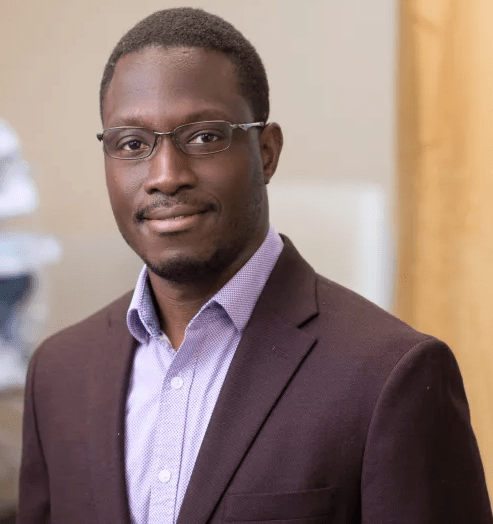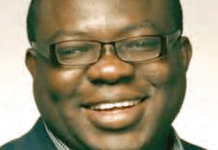A deadly plague sweeps through the world with rage
Darkness descends, re-enacting the medieval Black plague
Mighty and small, old and young fall in their thousands
Yet the pestilence craves more with reckless abandon
Sages and mages race to fathom the evil albatross
But a hero from the third world kindles our hope
A new dawn has come, the plague is at bay

And all who live will remember his name…
After several months of painstaking research and clinical trials, the long awaited vaccine for the deadly coronavirus has finally been produced. The COVID-19 pandemic, which has been tagged the worst public health crisis of our time, has infected more than 80 million people worldwide and claimed more than 2 million lives as at 19 January 2021.
However, due to the diligence and brilliance of the research team of the pharmaceutical giant, Pfizer, and their partner BioNTech, led by Dr Onyema Ogbuagu, the coronavirus vaccine, projected to take two years to develop, has been produced in record time of less than eight months. Before now, the average time to develop and make a vaccine publicly available was about 16 years. In fact, the only other vaccine that has ever come close to matching the current COVID-19 vaccine in pace of development is the mumps vaccine, which still took about four years to get all necessary permissions and licensing.
The Pfizer-BioNTech vaccine which was first approved for use in the UK on 2 December 2020 is the first internationally recognised COVID-19 vaccine approved by the World Health Organisation (WHO), after having completed all mandatory stages in vaccine development. The Russian and the Chinese vaccines which were earlier released in August, 2020 did not complete the mandatory Phase III trials before they were approved.
Interestingly, the Pfizer-BioNTech vaccine which Ogbuagu helped develop has been shown to be the most efficacious vaccine, recording up to 95 per cent effectiveness even against new emerging strains of the coronavirus. The vaccine was tested on 43,500 people in six countries without any safety concerns being raised during its clinical trials. Pfizer has said it will be able to supply around 1.3 billion doses by the end of 2021. This, according to medical experts, will go a long way in curbing the spread of the virus by providing immunity to many and reversing the recent trend of the daily increase of COVID-19 fatalities around the world.

Specialty and interests
Dr Onyema Ogbuagu is a Nigerian born American infectious disease specialist and associate professor of medicine at Yale School of Medicine, Yale University, USA. The medical doctor who directs the university’s HIV/AIDS clinical trials research programme and the institution’s clinical studies around COVID-19 has spent his career investigating some of the world’s most pervasive infectious diseases including Ebola, SARS and MERS. He has also provided care for COVID-19 and HIV/AIDS patients.
Ogbuagu and his team were able to produce the Pfizer vaccine in record time because they did not have to develop it from scratch. The team had previously worked on the MERS viruses which belong to the coronavirus family during the outbreak in 2012; and the SARS virus outbreak in 2003. Moreover, the novel mRNA vaccine development technique which Ogbuagu and his team employed is faster, compared to the well-known protein vaccine development. The mRNA technique does not require a researcher to produce protein or weakened pathogens for the vaccine development.
The genetic material mRNA is easy to make in a laboratory and manufacturing an mRNA vaccine rather than a protein one can save months in time. Ogbuagu’s ground-breaking research in the field of modified genetic code and mRNA technology has made him the cynosure of all eyes, and his role as the principal investigator of the Pfizer team which developed the coronavirus vaccine has brought him global recognition.
Background and education
Onyema Ogbuagu was born to the family of Chibuzor and Stella Ogbuagu in New Haven, Connecticut, USA, while they were pursuing their doctorate degrees in Yale. Onyema’s father was a former vice-chancellor of Abia State University, Nigeria, and his mother was a professor of sociology who was the best graduating student of the class of 1974 at the University of Nigeria, Nsukka (UNN).
Born as a twin, Ogbuagu’s brother is an accomplished engineer. The family later moved back to Nigeria where the twins had their secondary and university education.
Ogbuagu graduated from the School of Medicine, University of Calabar, Nigeria in 2003. After graduation, he had his medical internship/housemanship at the Ebonyi State University Teaching Hospital, Abakaliki, Nigeria. He then went back to the United States where he also interned at Mount Sinai School of Medicine (Elmhurst), New York, USA. He became a resident doctor at the institution and then rose to become chief resident at the same school.
Ogbuagu became a fellow of infectious diseases, Yale University School of Medicine, and then rose to the height of an associate professor of medicine at the same institution. He has worked there for over five years, focusing on finding a cure for HIV/AIDS. He has been the principal investigator on numerous pharmacokinetic, phase 2 and 3 safety and efficacy trials of novel antiviral compounds.
The associate professor has led several researches in the US and Africa. He worked in the faculty of the human resources for a health programme in Rwanda, where he mentored medical residents and junior faculty in clinical research projects locally relevant in addressing important infectious diseases-related problems (particularly HIV/AIDS and antimicrobial resistance). He has also worked at the Liberia College of Physicians and Surgeons (LCPS).
Awards and recognitions
In 2015, Ogbuagu was a Fellow of the American College of Physicians. In 2017, he was a nominee for Charles W. Bohmfalk Award in Clinical Science, Yale University School of Medicine. In the same year, he won the Steve Huot Faculty Award for Dedication and Excellence, Yale University School of Medicine Internal Medicine Primary Care programme.
In 2019, Ogbuagu was awarded the Gerald H. Friedland award for outstanding international research. In 2020, he emerged as a nominee for Charles W. Bohmfalk Award in Clinical Science, Yale University School of Medicine. Indeed, from all indications, many more awards are bound to follow in the coming months and years!











meds online without doctor prescription: https://genericwdp.com/ india pharmacy drugs
tadalafil 60 mg for sale: http://tadalafilonline20.com/ tadalafil 40 mg daily